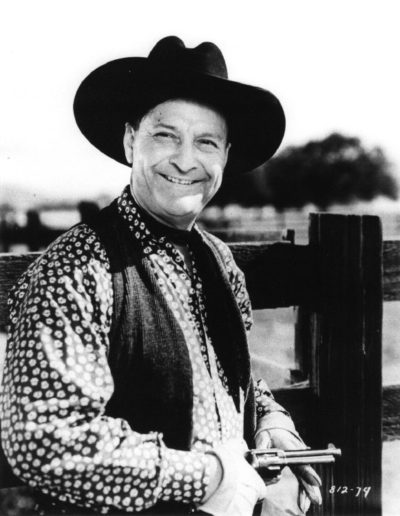Max Terhune (Max Terhune)

Max Terhune’s father died when he was seven (1898). He worked as a tool maker and when he was 20 he played semi-pro baseball for teams in Minneapolis and Indianapolis; he also spent the 1913 season playing Class-D baseball for the Vincennes Alices of the Kitty League. During this time he became friends with Kermit Maynard, a star university athlete who launched a career as a silent western movie star that continued into the sound era. Kermit’s younger brother was Ken Maynard, a hugely popular western star from the early 1920s through the 1930s. At 23, an uncle, “a left-handed fiddler”, Terhune recalled, convinced the young man to come with him to a talent contest where Max won first prize with his whistling routines. He began seeking work in vaudeville houses and soon played with acts like the Hoosier Hotshots and toured 46 weeks with Roy Lee Brown’s Hickville Follies. Terhune said when he received an excellent newspaper review (“Max Terhune made a tremendous hit with his bird and barnyard animal imitation.”) while playing a Chevrolet dealers’ convention in Muncie, Indiana he was able to use it as an introduction in 1932 to the National Barn Dance radio program on WLS in Chicago. This is where he formed a strong friendship with Gene Autry. It was Autry who introduced him to Republic Pictures and featured him in several of his early films before Terhune joined the Mesquiteers series.
Max Terhune performed in 21 episodes of a popular Republic Studios western series called The Three Mesquiteers. His character, Lullaby Joslin, was launched by another popular character actor, Syd Saylor, but then Max Terhune stepped into the series which, involving 12 different actors, lasted for a total of 51 pictures over eight years. His co-stars in 15 of the pictures were Robert Livingston and Ray “Crash” Corrigan. He then worked with Corrigan and John Wayne, who took over Livingston’s role shortly before Wayne’s career was launched by his starring role in “Stagecoach”. Terhune and Corrigan went on to work together in another trio western series, The Range Busters (24 entries with Ray Corrigan and John King at Monogram Pictures). He did several supporting roles with Gene Autry (at Republic). It was Autry, with whom he had worked in radio in Chicago, who convinced him to come to Hollywood. Later he worked in Johnny Mack Brown westerns at Monogram. Terhune played the comic sidekick (Lullaby Joslin in the Mesquiteers movies and usually a character called Alibi thereafter)–with a major distinction. He always traveled the range with his dummy Elmer sharing his saddle. Elmer received a film credit for his appearances.
Besides being a ventriloquist, whistler and animal imitator, Max Terhune was a magician. Card tricks were his forte, and he often performed such in his movies. His former vaudeville act included juggling, bird calls and barnyard animal impressions, talents also incorporated into his sidekick roles. His hands doubled for those of Clark Gable in “The King and Four Queens” in 1956. He performed on occasion at The Magic Castle in Hollywood. (Source: Audio interview: Max Terhune 1971) He appeared frequently on weekends in the 1950s at Corriganville, a popular western film location developed by his co-star and friend who purchased the land in the late 1930s. Tourists paid to see stunt shows and musical performances as well as wander around the western streets where scores of films and TV episodes were filmed over 25 years. His last film role was in the major Hollywood film Giant, in which he played the dramatic role of the physician Dr. Walker. Max Terhune died in Cottonwood, Arizona, at the age of 82.
Born
- February, 12, 1891
- USA
- Franklin, Indiana
Died
- June, 05, 1973
- USA
- Cottonwood, Arizona
Cemetery
- Valley View Cemetery
- Clarkdale, Arizona
- USA


